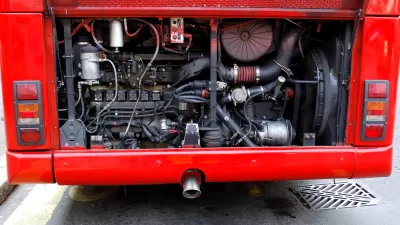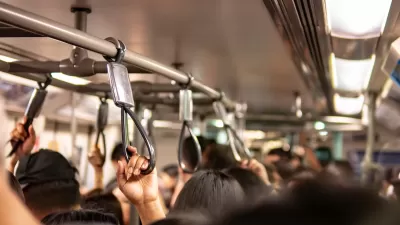Why would the nation's major public transit organization work so closely with America' major road lobbying group, even when it comes to opposing landmark climate legislation aimed at reducing 33% of U.S. greenhouse gas emissions from transportation?
The strange alliance has proved beneficial in Congress, providing a framework for compromise amongst Democrats, Republicans, and urban, suburban and rural interests, notwithstanding the apparent short-changing of the transit advocates.
"Here's one inconvenient truth holding in line the status quo of automobile dependency in the United States: the nation's primary proponent of transit, the American Public Transportation Association (APTA), stands on virtually every issue hand-in-hand with the American Association of State Highway and Transportation Officials (AASHTO), the nation's main advocates of increased highway spending.
APTA and AASHTO have shown themselves committed to retaining a structural funding split in favor of highways over other modes of travel, despite the fact that that reliance systematically enforces automobile dependency. The organizations' approach to the Senate's proposed energy and climate legislation has been little different. in a joint statement in mid-May, APTA and AASHTO argued against the bill because about two-thirds of new revenues sourced from fuel consumption would be directed to non-transportation related investments, equivalent to heresy in their minds."
From Pittsburgh Post-Gazette: Transportation interests oppose new climate bill: "Twenty-eight groups representing government transportation officials, trucking interests, mass transit operators, transit employees, motorists, construction workers and contractors said the legislation would impose higher fuel tax costs but divert most of the money from transportation improvements." [See Coalition letter on transportation funding and the American Power Act"].
However, other transportation groups endorse the transportation approach in the legislation. "The American Power Act represents a key step towards creating a long-term policy that will meet our country's future climate, energy and transportation goals, "said Transportation for America Director James Corless.
Thanks to Marilyn Skolnick
FULL STORY: The Highway-Transit Alliance Strains the Senate's Energy Legislation

Alabama: Trump Terminates Settlements for Black Communities Harmed By Raw Sewage
Trump deemed the landmark civil rights agreement “illegal DEI and environmental justice policy.”

Study: Maui’s Plan to Convert Vacation Rentals to Long-Term Housing Could Cause Nearly $1 Billion Economic Loss
The plan would reduce visitor accommodation by 25% resulting in 1,900 jobs lost.

Planetizen Federal Action Tracker
A weekly monitor of how Trump’s orders and actions are impacting planners and planning in America.

Restoring Northern India’s Himalayan ‘Water Temples’
Thousands of centuries-old buildings protect the region’s natural springs and serve as community wells and gathering places.

Milwaukee to Double Bike Share Stations
Bublr Bikes, one of the nation’s most successful, will add 500 new e-bikes to its system.

DC Extends Application Window for Outdoor Dining Permits
District restaurants will have until the end of November to apply, but businesses with permits in rush hour parking lanes must end operations on July 31.
Urban Design for Planners 1: Software Tools
This six-course series explores essential urban design concepts using open source software and equips planners with the tools they need to participate fully in the urban design process.
Planning for Universal Design
Learn the tools for implementing Universal Design in planning regulations.
Caltrans
Smith Gee Studio
Institute for Housing and Urban Development Studies (IHS)
City of Grandview
Harvard GSD Executive Education
Toledo-Lucas County Plan Commissions
Salt Lake City
NYU Wagner Graduate School of Public Service




























